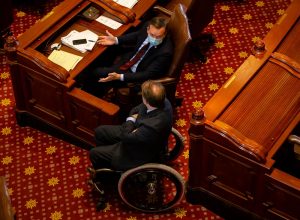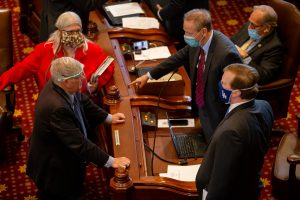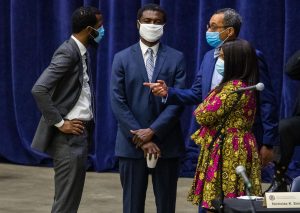Vote-by-mail expansion headed for governor’s signature after Senate passage
By Ben Orner Capitol News Illinois — May 22, 2020
Sen. Andy Manar, D-Bunker Hill, talks with Sen. Dan McConchie, R-Hawthorn Woods, during debate on SB1863, a bill dealing with voting by mail and other changes for the 2020 election, on the floor of the Illinois Senate during session Friday, May 22 at the Illinois State Capitol in Springfield. [Pool photo by Justin L. Fowler/The State Journal-Register]
After more than an hour of floor debate, the upper chamber passed Senate Bill 1863 by a 37-19 party-line vote. Three Democrats — Jacqueline Collins, of Chicago, Robert Martwick, of Chicago, and Pat McGuire, of Crest Hill — did not vote.
The bill, which Pritzker has said he supports, expands mail-in voting for the Nov. 3 general election in anticipation of social distancing and other restrictions related to the COVID-19 pandemic that will make in-person voting more challenging.
The bill requires Illinois’ local election offices, by Aug. 1, to mail or email vote-by-mail ballot applications to any voter who cast a ballot in 2018, 2019 or 2020, as well as voters who registered or changed addresses after the March primary.
Bill proponents estimate 4.8 million people will receive applications. The bill also states that by Sept. 15, the secretary of state must send a notice to people who received an application but have not yet returned it.
Completed ballots would be returned via mail or in new “collection sites,” that would consist of boxes placed in locations at the discretion of local election officials.
As for voting in person, the bill would allow local election authorities to implement curbside voting, in which voters can drive up, be handed a ballot and fill it out in their cars.
SB 1863 would also expand the existing Election Day a state holiday for state employees to include public schools and universities, but only for the 2020 election.

Sen. Dale Righter, R-Mattoon, talks with Sen. Jim Oberweis, R-Sugar Grove, during debate on SB1863, a bill dealing with voting by mail and other changes for the 2020 election, on the floor of the Illinois Senate during session Friday, May 22 at the Illinois State Capitol in Springfield. [Pool photo by Justin L. Fowler/The State Journal-Register]
Among the issues that Republican senators raised to state Sen. Julie Morrison D-Lake Forest, the bill’s lead Senate sponsor, were costs, input from county clerks, the security of collection sites and ballot applications being sent automatically and in some cases by email.
State Sen. Paul Schimpf, R-Waterloo, took issue with a provision that allows citizens as young as 16 to be election judges. Morrison said that is to make up for an expected decrease in elderly judges, many of whom did not show up during the March primary because of safety concerns.
“We lost a great number of experienced election judges who are retired and older people who quite simply have a great deal of hesitation now in performing those election duties that they’ve enjoyed for so many years,” Morrison said. She added it is also an “excellent way for us to engage the younger generation in our government.”
Schimpf also argued the bill creates a system with “significant” costs that are unnecessary given that Illinois already allows any citizen to vote by mail. He added it would also place a “significant burden” on local election authorities, whom he also argued have not been able to offer enough input.
The Illinois State Board of Elections filed a fiscal note saying that if the bill’s provisions are fully implemented by every local election authority, it would eat up every dollar of the more than $16.7 million the state will receive from the federal CARES Act for elections.
House sponsor Rep. Kelly Burke, D-Evergreen Park, however, said during floor debate on Thursday that ISBE’s estimate is “extremely generous” because she does not expect every election office to implement every provision.

Sen. Julie Morrison, D-Lake Forest, listens to questions from the Republican side of the aisle during debate on SB1863, a bill dealing with voting by mail and other changes for the 2020 general election, on the floor of the Illinois Senate during session Friday, May 22 at the Illinois State Capitol in Springfield. [Pool photo by Justin L. Fowler/The State Journal-Register]
Pritzker threw his support behind SB 1863 on Thursday, May 21 saying during his daily briefing that it balances voting access with available resources.
“I’m very much in favor of making sure that everybody gets a ballot who is eligible to vote and then returns that ballot,” he said.
The measure passed the House of Representatives 72-43 on Thursday evening after a nearly three-hour debate that featured Republicans grilling Burke. Multiple GOP representatives expressed their concerns over the collection box system, for example, which Rep. Lindsay Parkhurst, R-Kankakee, argued could lead to voter fraud.
“There’s not enough checks and balances, there’s not enough security, there’s not enough integrity to this ballot-harvesting drop-box system,” she said.
To address security concerns related to the optional collection sites, Senators passed House Bill 2238 on Friday before debating SB 1863. That trailer bill would, among other things, require collection boxes to be locked and opened only by election authorities. It also requires ISBE to establish additional guidelines.
The trailer bill will need to be passed by the House in order to go to the governor’s desk.
SB 1863 applies to only this November’s general election.
borner@capitolnewsillinois.com







